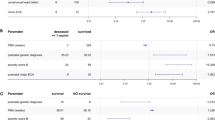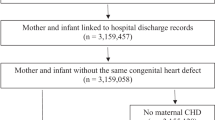Abstract
Objective
To identify social stressors and supports for expectant parents after prenatal diagnosis of congenital heart disease (CHD) and inform interventions to reduce distress.
Method
Parents of children diagnosed prenatally with CHD (N = 37) were purposively sampled across eight health systems. Qualitative data were collected using crowdsourcing methods and coded/analyzed using thematic analysis.
Results
Social stressors increasing distress after prenatal diagnosis were widely endorsed: (1) feelings of loneliness (most common: 68%), (2) well-meaning yet unhelpful comments, (3) loss of celebration of pregnancy, (4) information overload, and (5) untimely/insensitive discussions surrounding pregnancy termination. Social supports included: (1) emotional support and small acts of kindness, (2) hope/connection through the experiences of others, (3) informational support, (4) nurturing normalcy and the joy of pregnancy, and (5) connection through religion/spirituality.
Conclusion
Interpersonal relationships are vital for coping with prenatal diagnosis. Interventions to reduce distress after prenatal diagnosis should attend to common social stressors.
This is a preview of subscription content, access via your institution
Access options
Subscribe to this journal
Receive 12 print issues and online access
$259.00 per year
only $21.58 per issue
Buy this article
- Purchase on SpringerLink
- Instant access to full article PDF
Prices may be subject to local taxes which are calculated during checkout
Similar content being viewed by others
Data availability
The data that support the findings of this study are available on request from the corresponding author. The data are not publicly available due to privacy or ethical restrictions.
References
Kuersten-Hogan R, McHale JP. The Transition to Parenthood: A Theoretical and Empirical Overview. In: Kuersten-Hogan R, McHale JP, eds. Prenatal Family Dynamics. Cham: Springer; 2021. p. 3–21.
Stone SL, Diop H, Declercq E, Cabral HJ, Fox MP, Wise LA. Stressful events during pregnancy and postpartum depressive symptoms. J Womens Health. 2015;24:384–93.
Howard LM, Khalifeh H. Perinatal mental health: a review of progress and challenges. World Psychiatry. 2020;19:313–27.
Paulson JF, Bazemore SD. Prenatal and postpartum depression in fathers and its association with maternal depression: a meta-analysis. J Am Med Assoc. 2010;303:1961–9.
Leach LS, Poyser C, Cooklin AR, Giallo R. Prevalence and course of anxiety disorders (and symptom levels) in men across the perinatal period: a systematic review. J Affect Disord. 2016;190:675–86.
Rogers A, Obst S, Teague SJ, Rossen L, Spry EA, Macdonald JA, et al. Association between maternal perinatal depression and anxiety and child and adolescent development: a meta-analysis. JAMA Pediatr. 2020;174:1082–92.
Kasparian NA. Heart care before birth: A psychobiological perspective on fetal cardiac diagnosis. Prog Pediatr Cardiol. 2019;54:101142.
Hansen K, Kukora SK, Sherman A, Feldman K. Mental health in pregnancy complicated by fetal anomaly: depression screening and referrals in a single fetal care center. J Perinatol. 2024. https://doi.org/10.1038/s41372-024-02118-8.
Wu Y, Kapse K, Jacobs M, Niforatos-Andescavage N, Donofrio MT, Krishnan A, et al. Association of maternal psychological distress with in utero brain development in fetuses with congenital heart disease. JAMA Pediatr. 2020;174:e195316.
Tesson S, Swinsburg D, Nielson-Jones C, Costa DSJ, Winlaw DS, Badawi N, et al. Mother-infant dyadic synchrony and interaction patterns after infant cardiac surgery. J Pediatr Psychol. 2024;49:13–26.
van der Linde D, Konings EE, Slager MA, Witsenburg M, Helbing WA, Takkenberg JJ, et al. Birth prevalence of congenital heart disease worldwide: a systematic review and meta-analysis. J Am Coll Cardiol. 2011;58:2241–7.
Quartermain MD, Pasquali SK, Hill KD, Goldberg DJ, Huhta JC, Jacobs JP, et al. Variation in prenatal diagnosis of congenital heart disease in infants. Pediatrics. 2015;136:e378–85.
Dempsey AG, Chavis L, Willis T, Zuk J, Cole JCM. Addressing perinatal mental health risk within a fetal care center. J Clin Psychol Med Settings. 2021;28:125–36.
Tacy TA, Kasparian NA, Karnik R, Geiger M, Sood E. Opportunities to enhance parental well-being during prenatal counseling for congenital heart disease. Semin Perinatol. 2022;46:151587.
Bedaso A, Adams J, Peng W, Sibbritt D. The relationship between social support and mental health problems during pregnancy: a systematic review and meta-analysis. Reprod Health. 2021;18:162.
Asselmann E, Kunas SL, Wittchen HU, Martini J. Maternal personality, social support, and changes in depressive, anxiety, and stress symptoms during pregnancy and after delivery: A prospective-longitudinal study. PLoS ONE. 2020;15:e0237609.
Mirzakhani K, Ebadi A, Faridhosseini F, Khadivzadeh T. Well-being in high-risk pregnancy: an integrative review. BMC Pregnancy Childbirth. 2020;20:526.
Thomas JC, Letourneau N, Bryce CI, Campbell TS, Giesbrecht GF. APrON Study Team. Biological embedding of perinatal social relationships in infant stress reactivity. Dev Psychobiol. 2017;59:425–35.
Appleton AA, Kiley K, Holdsworth EA, Schell LM. Social support during pregnancy modifies the association between maternal adverse childhood experiences and infant birth size. Matern Child Health J. 2019;23:408–15.
Sood E, Gramszlo C, Perez Ramirez A, Braley K, Butler SC, Davis JA, et al. Partnering with stakeholders to inform the co-design of a psychosocial intervention for prenatally diagnosed congenital heart disease. J Patient Exp. 2022;9:23743735221092488.
Brabham DC. Cambridge, Massachusetts: MIT Press Essential Knowledge Series. Crowdsourcing. 2013.
Sood E, Wysocki T, Alderfer MA, Aroian K, Christofferson J, Karpyn A, et al. Topical review: crowdsourcing as a novel approach to qualitative research. J Pediatr Psychol. 2021;46:189–96.
Forrest CB, Margolis PA, Bailey LC, Marsolo K, Del Beccaro MA, Finkelstein JA, et al. PEDSnet: a national pediatric learning health system. J Am Med Inform Assoc. 2014;21:602–6.
Palinkas LA, Horwitz SM, Green CA, Wisdom JP, Duan N, Hoagwood K. Purposeful sampling for qualitative data collection and analysis in mixed method implementation research. Adm Policy Ment Health. 2015;42:533–44.
Braun V, Clarke V. Using thematic analysis in psychology. Qual Res Psychol 2006;3:77–101.
Biber S, Andonian C, Beckmann J, Ewert P, Freilinger S, Nagdyman N, et al. Current research status on the psychological situation of parents of children with congenital heart disease. Cardiovasc Diagn Ther. 2019;9:S369–76.
Vainberg LD, Vardi A, Jacoby R. The experiences of parents of children undergoing surgery for congenital heart defects: a holistic model of care. Front Psychol. 2019;10:2666.
Berant E, Mikulincer M, Florian V. Marital satisfaction among mothers of infants with congenital heart disease: the contribution of illness severity, attachment style, and the coping process. Anxiety Stress Coping. 2003;16:397–415.
Demianczyk AC, Bechtel Driscoll CF, Karpyn A, Shillingford A, Kazak AE, Sood E. Coping strategies used by mothers and fathers following diagnosis of congenital heart disease. Child Care Health Dev. 2022;48:129–38.
Joo JH, Bone L, Forte J, Kirley E, Lynch T, Aboumatar H. The benefits and challenges of established peer support programmes for patients, informal caregivers, and healthcare providers. Fam Pract. 2022;39:903–12.
Driscoll CFB, Christofferson J, McWhorter LG, Demianczyk AC, Brosig CL, Jackson EA, et al. A psychosocial care model for families affected by congenital heart disease. Pediatr Crit Care Med. 2023;24:901–9.
Lumsden M, Smith D, Wittkowski A. Coping in parents of children with congenital heart disease: a systematic review and meta-synthesis. J Child Fam Stud. 2019;28:1736–53.
Sood E, Karpyn A, Demianczyk AC, Ryan J, Delaplane EA, Neely T, et al. Mothers and fathers experience stress of congenital heart disease differently: recommendations for pediatric critical care. Pediatr Crit Care Med. 2018;19:626–34.
Gramszlo C, Karpyn A, Christofferson J, McWhorter LG, Demianczyk AC, Neely T, et al. Meeting parents’ needs for education and preparation following congenital heart disease diagnosis: recommendations from a crowdsourced study. Am J Perinatol. 2024;41:e446–55.
Wilpers A, White M, Austin MT, Bahtiyar MO, Francis K, Emery SP, et al. Development and validation of a scale to measure person-centered care in fetal care centers. Fetal Diagn Ther. 2024;51:243–54.
Wilpers AB, Francis K, Powne AB, Somers L, Ren Y, Kohari K, et al. Differences in person-centered care in fetal care centers: results from the U.S. pilot study of the PCC-FCC scale. J Pers Med. 2024;14:772.
Hankin BL, Demers CH, Hennessey EP, Perzow SED, Curran MC, Gallop RJ, et al. Effect of brief interpersonal therapy on depression during pregnancy: a randomized clinical trial. JAMA Psychiatry. 2023;80:539–47.
Sockol LE. A systematic review and meta-analysis of interpersonal psychotherapy for perinatal women. J Affect Disord. 2018;232:316–28.
Nurjannah I, Mills J, Park T, Usher K. Conducting a grounded theory study in a language other than English: procedures for ensuring the integrity of translation. SAGE Open. 2014;4:1–10.
Acknowledgements
The authors would like to thank the parent participants and parent research partners for their contributions to this study. The senior author would also like to thank the faculty of the PEDSnet Scholars Training Program.
Funding
This work was supported by the AHRQ-PCORI funded PEDSnet Scholars Training Program (5K12HS026393 [to ES]).
Author information
Authors and Affiliations
Contributions
This manuscript has been read and approved by all of the authors, the requirements for authorship have been met and nobody who qualifies for authorship has been excluded. All authors have made a substantial contribution to the concept or design of the article; or the acquisition, analysis, or interpretation of data for the article, as listed below: Emily Marshall: Data analysis and interpretation; Colette Gramszlo: Data acquisition, analysis, and interpretation; Alejandra Perez Ramirez: Data acquisition and analysis; Anne Kazak: Concept and design of study and data interpretation; Amanda Shillingford: Design of study and data interpretation; Cynthia Ortinau: Design of study and data interpretation; Sarah Kelly: Design of study and data interpretation; Nadine Kasparian: Design of study and data interpretation; Lindsay Edwards: Design of study and data interpretation; Allison Divanovic: Design of study and data interpretation; Jo Ann Davis: Design of study and data interpretation; Samantha Butler: Design of study and data interpretation; Katherine Braley: Design of study and data interpretation; Erin Riegel: Design of study and data interpretation; Erica Sood: Concept and design of study and data acquisition, analysis, and interpretation.
Corresponding author
Ethics declarations
Competing interests
The authors declare no competing interests.
Ethical approval
This study received approval from the Nemours Children’s Health Institutional Board (#1395313) and was performed in accordance with the Declaration of Helsinki.
Informed consent
Informed consent was obtained from all participants prior to study procedures. All participants were adults and therefore parental permission does not apply.
Additional information
Publisher’s note Springer Nature remains neutral with regard to jurisdictional claims in published maps and institutional affiliations.
Supplementary information
Rights and permissions
Springer Nature or its licensor (e.g. a society or other partner) holds exclusive rights to this article under a publishing agreement with the author(s) or other rightsholder(s); author self-archiving of the accepted manuscript version of this article is solely governed by the terms of such publishing agreement and applicable law.
About this article
Cite this article
Marshall, E., Gramszlo, C., Perez Ramirez, A. et al. Interpersonal relationships after prenatal diagnosis of congenital heart disease: Social stressors and supports. J Perinatol 45, 907–913 (2025). https://doi.org/10.1038/s41372-025-02250-z
Received:
Revised:
Accepted:
Published:
Issue date:
DOI: https://doi.org/10.1038/s41372-025-02250-z



